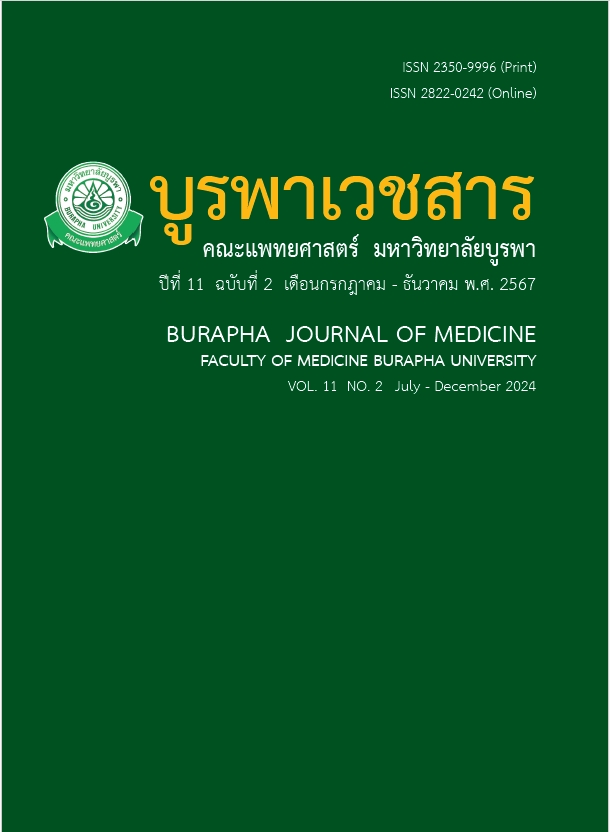Behavioral factors affecting hemoglobin A1c levels in patients with Type II diabetes mellitus
Keywords:
Behavioral factors, Hemoglobin A1c level, Type 2 diabetic patientsAbstract
Context: Morbidity and mortality of patients with Diabetes Mellitus are the results of
complications caused by poor blood glucose control. The Hemoglobin A1c (HbA1c) levels
are an index of long-term diabetic control and are related to various factors including the patient’s behavior. Campaigning tasks to regulate behavioral factors that affect HbA1c levels will hopefully improve patients’ health.
Objectives: To identify factors related to HbA1c levels in diabetic patients.
Methods: This is a cross-sectional analytic study. Data were gathered from individuals diagnosed with type 2 diabetes who utilized services at the hospitals and affiliated clinics of Chao Phraya Abhaibhubejhr Hospital, located in the Mueang District and surrounding regions of Prachinburi Province. Participants were selected based on the absence of severe comorbidities or terminal
illnesses that would hinder their ability to lead a normal life during the month of June to August 2017. The study sample comprised 140 individuals drawn from a larger population of 6,500. This sample was categorized into two groups in a 2:1 ratio. The experimental group included 94 participants with a HbA1c level exceeding 7 mg%, while the compared group consisted of 48 participants with a HbA1c level less than or equal to 7 mg%. Purposive sampling techniques were employed for participant selection. A questionnaire served as the primary research instrument, and both descriptive and inferential statistical methods were applied for data analysis.
Results: The research indicated that experimental group with a HbA1c level exceeding 7 mg% levels attributed this to improper medication usage, inconsistent physical activity, and the consumption of sugary foods and beverages. Conversely, other variables such as personal circumstances, stress levels, the involvement of caregivers in the treatment process, and
the necessity of traveling to a hospital for care did not significantly influence HbA1c levels. Furthermore, abstaining from sugary foods and drinks, coupled with regular physical activity and adherence to treatment protocols, emerged as strong predictors of achieving optimal Hemoglobin A1c levels (Nagelkerke R Square = 0.65). Notably, the impact of dietary choices regarding sweet foods and the frequency of exercise was found to be more critical than the correct administration of medication.
Conclusions: Behavioral factors affecting Hemoglobin A1c levels in samples diabetes include: incorrect medication use and irregular exercise together with eating sweet food and sugary drinks.
References
Hfocus.org. The International Diabetes Federation. [Internet]. [accessed Apr 1, 2023]. Available from: http://www.hfocus.org/content/2019/11/18054. (in Thai)
Department of Disease Control. Global Diabetes Situation [Internet]. [accessed Apr 1, 2023]. Available from: https://pr.moph.go.th/?url=pr/detail/2/02/181256/. (in Thai)
Bangkok Hospital Phuket. Diabetes [Internet]. [accessed Apr 1, 2023]. Available from: https://www.phukethospital.com/th/news-events/diabetes/. (in Thai)
Fletcher B, Gulanick M, Lamendola C. Risk factors for type 2 diabetes mellitus. J Cardiovasc Nurs. 2002; 16: 17-23.
Colditz GA, Willett WC, Rotnitzky A, Manson JE. Weight gain as a risk factor for clinical diabetes mellitus in women. Ann Intern Med. 1995; 122: 481-6.
Suwattanakul T. Factors related to blood sugar control among diabetes mellitus type 2 patients. Journal of Health Systems Research. 2018; 12: 515–22. (in Thai)
Hsieh FY, Bloch DA, Larsen MD. A simple method of sample size calculation for linear and logistic regression. Statis Med. 1998; 17: 1623-34.
Yenipinar A, Koc S, Canga D, Kaya F. Determining sample size in logistic regression with G-power. BSJ Eng Sci. 2019; 2: 16-22.
Kanglee K. Factors associated with glycemic control among people with type 2 diabetes mellitus at Phramongkutklao Hospital, Bangkok. Journal of The Royal Thai Army Nurses. 2014; 15: 256–68. (in Thai)
Suthipol K. Factors associated to glycemic control in adults with type 2 diabetes, Prachanu-Khro PCU, Ratchaburi Hospital. Maharaj Nakhon Si Thammarat Medical Journal. 2022; 5: 1–12. (in Thai)
Jesrichai A. Factors predicting self-care behaviors among the elderly with diabetes in Phichit province. Phichit Public Health Research and Academic Journal. 2020; 1: 24–34. (in Thai)
Hayeepachi N, Pouyfung P. Effective factors associated with controlling blood sugar among diabetes mellitus type 2 patients on follow-up at medical division, Chiang Rai Municipality. Journal of Nursing, Public Health and Education. 2019; 20: 83–94. (in Thai)
Dube P. BMI – A significant risk factor for type 2 diabetes. In: HealthifyMe [Internet]. [accessed Apr 2, 2023]. Available from: https://www.healthifyme.com/blog/bmitype- 2-diabetes/.
Chantharathiratikun S, Hancharoen K, Charoenpitak R, Pandii W, Chongsuwat R. Factors related to blood sugar control in type 2 diabetic patients at Hospital, Bangkok [Dissertation]. Bangkok: Mahidol
University; 2007. (in Thai)
Buraphunt R, Muangsom N. Factors affecting uncontrolled type 2 diabetes mellitus of patients in Sangkhom Hospital, Udonthani Province. KKU Journal for Public Health Research. 2013; 6: 102–9. (in Thai)
Sridama V. Diabetic diets. Chula Med J. 1996; 40: 417–23. (in Thai)
Peirce NS. Diabetes and exercise. Br J Sports Med. 1999; 33: 161–72.
Asche C, LaFleur J, Conner C. A Review of diabetes treatment adherence and the association with clinical and economic outcomes. Clin Ther. 2011; 33: 74–109.
Wongsunopparat B, Ngarmukos C, Saibuathong N. Glycemic control in persons with diabetes after attending a group educational program for diabetes self-management. Rama Nurs J. 2008; 14: 289–97. (in Thai)
Pennim K, Poonkerd S. The effect of behavior modification program on type 2 diabetes patients with HbA1c value more than 7 percent on accumulated blood sugar level: A case study of Laem Ton Subdistrict Health Promotion Hospital, Khuan Khanun District, Phatthalung Province [Research report]. Phatthalung:
Provincial Public Health Office; 2017. (in Thai)
Saotong T, Pichayapinyo P, Lagampan S. Effects of behavior change on glycemic control in type 2 diabetes patients with uncontrolled blood sugar. Journal of Health and Nursing Research. 2030; 36: 19–32. (in Thai)
Downloads
Published
How to Cite
Issue
Section
License
Copyright (c) 2024 Burapha University

This work is licensed under a Creative Commons Attribution-NonCommercial-NoDerivatives 4.0 International License.



